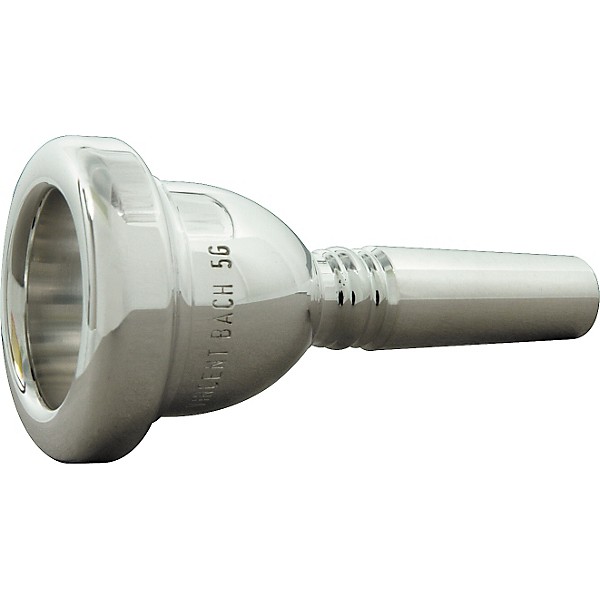Gear SpecialistBundlingMusician
Top-Seller
Bach Large Shank Trombone Mouthpiece 5G
(0)|Q&A|Item #:1274115059774 POS #:108269606
6-month special financing^ + $4 back in Rewards** Limited time Learn More
Open Box starting at $68.00
Style:5G
Save on orders $199+ and get expert advice from a Gear Adviser
Need Help?

Description
A carefully selected Bach mouthpiece can help improve a trombone player's embouchure, attack, tonguing and endurance.
Vincent Bach was a rare combination of artist and engineer. A mechanical genius and acclaimed trumpet soloist, his instruments and mouthpieces are used today in every major studio and orchestra in the world. Bach personally designed the tools and composed the plans that continue to set the high standards for making all Bach products today.
"Choosing the perfect mouthpiece is often more difficult than choosing the perfect instrument. Your success as a musician depends on the choice of equipment that will do justice to your capabilities." -Vincent Bach
Vincent Bach was a rare combination of artist and engineer. A mechanical genius and acclaimed trumpet soloist, his instruments and mouthpieces are used today in every major studio and orchestra in the world. Bach personally designed the tools and composed the plans that continue to set the high standards for making all Bach products today.
"Choosing the perfect mouthpiece is often more difficult than choosing the perfect instrument. Your success as a musician depends on the choice of equipment that will do justice to your capabilities." -Vincent Bach
Features
- Model No. / Depth of Cup / Approx. Cup Dia. / Rim Shape / Throat / Backbore / Description
- 1G / Deep / 28.00 mm / Medium thin, well rounded. / .319" / 800S / Extra large and deep for extraordinary power and depth of tone. Among the largest and most powerful bass trombone mouthpieces produced today.
- 1-1/4G / Deep / 27.50 mm / Medium thin, well rounded. / .276" / 429 / Cup diameter is smaller than No.1G, but still very large and deep, with the sonority preferred by the modern American school.
- 1-1/4GM / Deep / 27.50 mm / Medium thin, well rounded. / .319" / 800S / Same rim and cup as No.1-1/4G, but with a larger throat and backbore for large, powerful sound, well in tune.
- 1-1/2G / Deep / 27.00 mm / Medium wide, well rounded. / .276" / 429 / A large mouthpiece with powerful tone in the low register and great carrying power. For many years, the standard mouthpiece for the serious bass trombone player.
- 1-1/2GM / Deep / 27.00 mm / Medium wide, well rounded. / .319" / 800S / Larger throat and backbore than the No.112G results in less resistance, larger dynamic range, deeper, warmer sound.
- 2G / Deep / 26.75 mm / Medium narrow. / .276" / 429 / Deep, full, resonant tone. Big low register even through the pedal tones.
- 3G / Deep / 26.26 mm / Medium wide, well rounded. / .276" / 429 / Same rim shape and diameter as No.3 small shank tenor trombone, but with a deep bass trombone cup, throat, and backbore to facilitate pedal tones.
- 4G / Deep / 26.00 mm / Medium wide, slightly rounded. / .276" / 429 / Same rim shape and diameter as No.4 small shank tenor trombone. A versatile, large diameter mouthpiece especially useful when only one trombone is used for both the upper and very low register.
- 4GB / Deep / 26.00 mm / Medium thin, very well rounded. / .276" / 429 / Same cup, throat and backbore as the No.4G with a more rounded rim.
- 5G / Deep / 25.50 mm / Medium wide, semi flat. / .276" / 429 / Same rim shape and diameter as No.5 small shank tenor trombone. Similar playing characteristics to No. 4G with a slightly smaller cup diameter.
- 5GL / Medium deep / 25.50 mm / Medium wide, semi flat. / .276" / 429 / Old style, shallower model than No.5G, facilitates upper range.
- 5GB / Deep / 25.50 mm / Medium thin, very well rounded. / .276" / 429 / Same cup, throat and backbore as the No.5G with a more rounded rim.
- 5GS / Medium deep / 25.50 mm / Medium wide, semi flat. / .261" "G" / 420 (modified) / Shallower "G"-style cup with smaller throat and backbore than No. 5G produces easy high register, slightly brighter sound.
- 6-1/2A / Medium deep / 25.40 mm / Medium wide, well rounded. / .276" / 429 / Same rim and cup as No.612A small shank tenor trombone, but with full bass trombone throat and backbore for a rich, compact sound of large volume.
- 6-1/2AL / Medium deep / 25.40 mm / Medium wide, well rounded. / .261" "G" / 420 / The same cup, throat, and backbore as No.612AL small shank tenor trombone but with bass shank. It requires a well developed embouchure.
- 6-1/2AM / Medium deep / 25.40 mm / Medium wide, well rounded. / .257" "F" / 413 / The same rim, cup, throat, and backbore as No.612AM small shank tenor trombone mouthpiece, but with bass shank.

WARNING: This product can expose you to chemicals including Lead, which is known to the State of California to cause cancer, and to cause birth defects or other reproductive harm. For more information go to www.P65Warnings.ca.gov.




